2022-23 Holmes Scholars
Meet the 12 doctoral students who comprise the NC State Holmes Scholars Program chapter:
Jerome Amedu
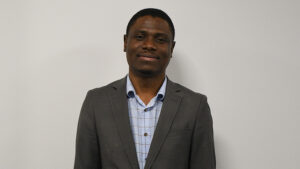
Jerome Amedu is a. candidate in the Ph.D. in Learning and Teaching in STEM: Mathematics and Statistics Education concentration at NC State University. He has had a variety of teaching experiences ranging from teaching middle school mathematics and high school mathematics to serving as a teaching assistant on different undergraduate and graduate-level courses. He has also worked as a research assistant on different projects, including the Validation of the Equity and Access Rubrics for Mathematics Instruction (VEAR-MI) project. Amedu’s research interests include teacher informal learning and educational technology, as well as equity and diversity.
Natalia Yanez Castillo
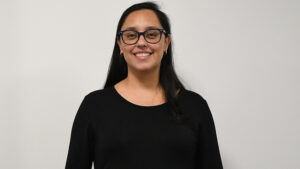
Natalia Yanez Castillo was born in Lima, Peru. She studied childhood education in Peru and worked at a Peruvian-British school for eight years. In 2014, Yanez Castillo moved to North Carolina and worked in Johnston County at a dual language immersion program in kindergarten. All those years of experience sparked her interest in understanding teaching practices and how teachers perceived their students’ abilities to learn in connection to their cultural backgrounds. With that interest in mind, Yanez Castillo applied to the Ph.D. Teacher Education and Learning Sciences: Elementary Education in Mathematics and Science concentration at NC State University and started her doctoral journey in 2019. Besides being passionate about education, Yanez Castillo is a huge soccer fan and loves to spend time with family getting to know new places.
Regina Ayala Chávez
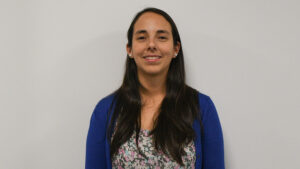
Regina Ayala Chávez is originally from Mexico and moved to the U.S. in 2017. She has a bachelor’s degree in physics and a master’s degree in engineering and is currently finishing a Ph.D. in the Learning and Teacher STEM: Science Education concentration at NC State University. Ayala Chávez’s background trained her in qualitative analysis and her journey through the Ph.D. program introduced her to qualitative research. In her academic journey, Ayala Chávez has published and presented in various journals and conferences across the science education community. She was part of the 2021-2022 SECASC Global Change Fellows, which helped her develop communication skills and grow her network. In April 2022, she started to work at Catalyst consulting group – a consulting firm focused on educational evaluation– as a research associate. Ayala Chávez’s research focuses on informal education about climate change. Mainly, she is interested in understanding what can motivate adults to have more pro-environmental behaviors and develop educational tools to help them achieve those behaviors. She is currently working with Assistant Professor K.C. Busch on a CAREER project which aims to develop an empirically-based conceptual model and metrics for community-level scientific literacy.
Shawnda Cherry
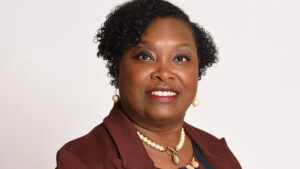
Mrs. Shawnda Cherry is a native of Creswell NC. She is currently a doctoral candidate in the NC State Educational Leadership program. She has a Bachelor’s of Science degree in Middle Grades Education (concentrations in Math & Science) and Master’s in School Administration and Instructional Specialist. She is a career educator with a wide range of experience spanning elementary, middle, high school and alternative settings serving as teacher, assistant principal, principal and director. While serving on the ECU Rural Education Institute Board of Directors, she developed a passion for advocating for underserved communities, especially those located in northeastern NC. She has served as a panelist on the BEST NC Teacher Recruitment Innovation Lab. Her research interests include alternative teacher licensure, teacher quality and teacher equity.
Brittani N. Clark
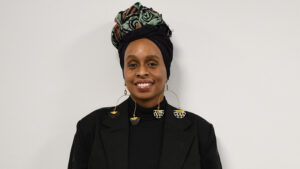
Brittani N. Clark is a doctoral candidate in the Ph.D. in Teacher Education and Learning Sciences: Educational Equity concentration at North Carolina State University, where she also earned her Master of Arts in Teaching in Special Education. Her research interests center the experiences of Black educators and Black children. Specifically, Clark’s research areas entail the shortage of Black teachers in K-12 schools as well as Black teacher educators in higher education. She is interested in the history of Black teachers and the need for policies that incentivize the teaching profession for Black educators. Clark currently serves on a committee at NC State that is dedicated to revamping the initial licensure programs to advance diversity, equity and inclusion. In her community work, she serves as a member of a number of organizations including the Durham Committee on the Affairs of Black People (DCABP), Durham’s Partnership for Children and Durham’s Campaign for Grade-Level Reading.
Corina De La Torre
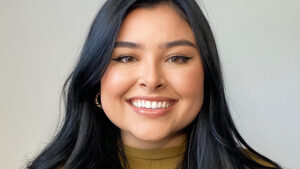
Corina De La Torre is a first-generation Chicana scholar-researcher, born and raised in East Salinas, California, where she learned the importance of hard work and community through her family’s and neighbors’ resiliency, De La Torre is now earning her Ph.D in the Teacher Education and Learning Sciences: Educational Psychology concentration at North Carolina State University. Her research focuses on rural Latinx youth identity development and cultivating racially and culturally inclusive, community-oriented learning spaces. Outside of the classroom, she is a community organizer advocating for long-term policy changes that will result in safe, thriving neighborhoods and schools.
Charlese Harris
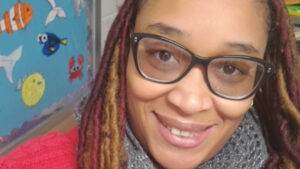
Charlese Harris is a Durham Public Schools teacher as well as a second-year doctoral candidate in Learning and Teaching in STEM: Mathematics and Statistics Education concentration at North Carolina State University. Her teaching experiences include grades 8 -12 math courses at the remedial, standard, honors and AP levels, with a specific focus on maximizing student growth in historically non-proficient students. With aspirations to foster the increase of student diversity and success in college-level mathematics courses, her research interests are curriculum and professional development design and implementation as well as equity and representation in policy and assessment practices. Research experiences include assistance with teacher assessment tools and professional development design. As a mathematics teacher educator, Harris hopes to bring the equitable, student-centered and project-based practices of current mathematics curricula to the development and implementation of teacher education curriculum and design.
Michael Hoyes Jr.
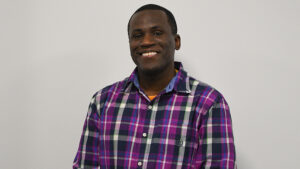
Michael Hoyes is earning his Ph.D. in the Learning and Teaching in STEM: Mathematics and Statistics Education concentration and is currently working on his dissertation investigating the mathematics identity of African American high school males while course-taking with gender- and racially-congruent mathematics teachers. He is a graduate research assistant working with Associate Dean Karen Hollebrands and Associate Professor Erin Krupa to train and establish master teachers in rural districts of North Carolina who can and will serve as teacher leaders within their district and the state. With over 10 years of classroom experience and three years of district-level teacher supervision experience, he has a professional goal of helping to create teachers who are mindful of their impact on student learning and opportunities to learn, and working to maximize the positive effects of teachers on their students.
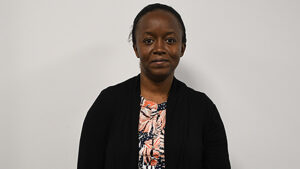
Ruth Mathenge
Over the last 11 years, Ruth Mathenge’s career has been anchored in the core mandate of the profession of teaching, mentorship and leadership for a better society. As a mathematics and physics teacher, Mathenge has always harbored great interest and passion in mentoring students from underrepresented communities in sciences and mathematics and working towards establishing a support system to ensure that they get into the STEM field careers. This is because scientists and engineers work towards finding solutions to problems facing humanity and, therefore, having a diverse workforce will increase the probability of producing goods and services that serve the needs of the diverse population. It is on this background that Mathenge, who is earning a Ph.D. in the Learning and Teaching in STEM: Science Education concentration, is excited to be part of the NC State Chapter of the American Association of College and Teacher Education (AACTE) Holmes Scholars Program.
Janell Miller
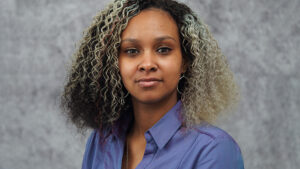
Janell Miller is a current doctoral candidate in the Ph.D. in Teacher Education and Learning Sciences: Literacy and English Language Arts concentration at NC State University. Previously, she graduated from NC State, completing her Bachelor of Arts in English and a Master of Science in Curriculum and Instruction. Miller spent seven years teaching high school English in three North Carolina counties before beginning the doctoral program. She is passionate about literacy, ELA, critical conversations, student writing and the formation of literate identities for high school students. Her research interests encompass various educational theories, including social justice education, culturally responsive and sustaining pedagogy, critical literacy, critical pedagogy, racial literacy, dialogic education and discourse theories.
Amelia Q. Rivera
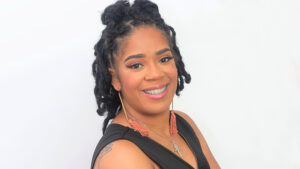
Amelia Rivera is a doctoral student in the Ph.D. in Teacher Education and Learning Sciences: Educational Equity concentration at NC State University and a Dean’s Fellowship recipient. She attended UNC-Chapel Hill, where she received her B.A. in Communication Studies (Speech & Hearing Sciences) and Linguistics and minored in African American Studies. Shortly after, she attained her M.Ed. in Reading and Literacy from Capella University. She began her career as a special education teacher as a 2009 Eastern North Carolina Teach For America corps member. She continued in education for more than 10 years as a special education and middle grades English teacher. Rivera has worked with Teach For America’s Pre-Service (formerly Summer Institute) Program as a teacher coach, content facilitator and, recently, as a content facilitator coordinator and coach coordinator, providing support for facilitators and coaches across the United States. Her educational career and experiences have led to current research interests that include African American English and raciolinguistics in education. She is interested in these areas from both student and teacher preparation perspectives and desires a strong base in multiple methodologies for conducting research. Her community organizing has also sparked a drive for a focus on community-engaged approaches to research.
Keisha White
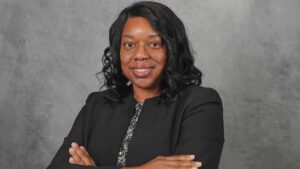
Keisha White graduated from NC State University, where she received a Master of School Administration degree through the NC State Educational Leadership Academy, a highly selective graduate program designed to develop school leaders for districts in rural northeastern North Carolina. White was superintendent at Paul R. Brown Leadership Academy, the first and only military charter school in North Carolina. As a former third-grade teacher, White was recognized among the top 25% in North Carolina for student academic growth, Northeast Elementary’s 2015-2016 Teacher of the Year, and WITN Channel 7’s “Teacher of the Week”. She has served as a beginning teacher mentor, grade level chair, Read to Achieve representative and a guest panel speaker for the North Carolina New Teacher Support Program. White is currently a graduate student at NC State University, where she is currently pursuing her doctoral degree in Educational Leadership.